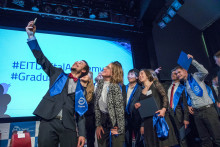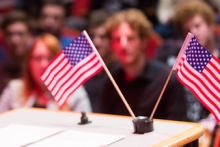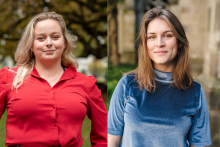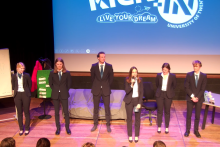The sun has barely risenover the stately buildings of the Swedish capital when the first students start to arrive at one of the Kungliga Tekniska Högskolan (KTH)’s branches. This day signifies the end of one chapter and the start of a new one for all of them. After two years of working towards their master’s degree at two different European universities, with summer school in between, they must now move beyond their certification.
Red thread
Innovation and entrepreneurship make up the red thread of the EIT Digital Master School, explains Willem Jonker, CEO of EIT Digital and part-time professor at UT. ‘It starts with a good technological basis. ICT is the core, supplemented by innovation and entrepreneurship. This programme sets itself apart by training what we call T-shaped computer scientists. So in terms of the underlying motivation, there is definitely a parallel with the Twente Education Model.’
But there are also differences, according to Jonker. ‘Yes, we do maintain a very strict selection process for our master’s programme. But then we do make sure our students are much better equipped than the average student. It takes incredibly hard work, even for events that might seem a bit more informal. That’s how it should be: work hard, party hard. We try to facilitate that as much as we can. Our students suffer very little delay, and very few of them quit.’
Gender-neutral bathrooms
No expense is spared, as evidenced by the graduation ceremony. Past the clusters of balloons and gender-neutral bathrooms, the students and their entourage wait while sampling local delicacies such as toast with salmon and pâté, which are arranged next to brightly coloured soft drinks. Further down the hall, rows of chairs and a podium have been set up, in preparation for the speeches.
Linnar Viik, one of the people who was involved in the very beginning of the Internet call service Skype, speaks about the skills the students will be expected to have in the future in his keynote address. ‘We are currently experiencing an information explosion, but we have not yet learned to fully understand it. Technology is developing increasingly fast, but society maintains a steady pace. This gap is growing, and our future will be determined by people who are able to bridge this gap and make proper use of information. Your vision is your greatest possession – make good use of it.’
Transformation
Jonker, who just flew in from Amsterdam after presenting Neelie Kroes with her honorary doctorate in Enschede, is up next to address the third round of master school graduates. ‘You are our hope for the future. You will be the leaders of the digital revolution.’ But Jonker also warns the students: ‘I’m hoping for a societal and inclusive transformation. That’s where the biggest challenge lies.’ He refers to Ed Brinksma’s farewell speech for UT’s anniversary, ‘The empathic engineer’. Jonker: ‘That concept is important for your future, you have to take responsibility for it. Make sure that the digital transformation goes hand in hand with a societal one.’
At around half past three in the afternoon, when the students are busy accepting their certificates and stoles at what seems like record speed, the light is already fading all over Stockholm. In between the group pictures and selfies, Jonathan Simsch talks about his year at UT as an EIT student. ‘A good community and a good campus. And I was also able to really feel the connection to the Knowledge Park,’ says the German-born Simsch. ‘One thing that really stood out to me is that things weren’t very hierarchical at all; professors addressed me by my first name. But the flip side of this very open and direct culture that you have is that you can be brutally honest sometimes.’
Out of your comfort zone
Graduate Bram Leenders completed his bachelor’s degree in computer science at UT, and then opted for the EIT Digital Master School, first in Berlin, then in Stockholm at KTH. ‘After having spent three years in Enschede, I wanted to travel to big cities abroad, meet other people from various cultural backgrounds. It’s like moving out of your parents’ house and into student housing for the first time – that whole experience of having to move out of your comfort zone, but then in a different city in a different country.’
Leenders will be staying in Stockholm for the time being. ‘Two months ago, I began working as a back-end engineer for Spotify,’ he says. ‘It’s not very entrepreneurial, but for a bigger company, it feels very free, like a start-up. People just show up for work wearing heavy metal T-shirts.’ Would he recommend the Master School to UT students? ‘If you’re doing an international programme and have a good idea of what you would like to do in terms of entrepreneurship, definitely. If you’re not too sure just yet, it will most likely not suit you as much. But at the same time, it is a wonderful opportunity, because you get offered so many opportunities – even financially.’
Warship and biological caviar
After dinner, the party heads for the Vasa Museum, which houses the imposing seventeenth-century warship Vasa in a huge hall. Here, the graduates toast with champagne and eat lobster and biological caviar. ‘Time will tell what these people will use their gifts for,’ says Jonker pensively. The UT professor of Database Technology won’t deny that the graduates are a special bunch. In fact, he isn’t afraid to call them the ‘elite’. ‘And I don’t mean that in a negative sense. So much has been invested in them. From now on, they will be able to give back to society. We expect these people to show leadership. They don’t all have to become entrepreneurs – it’s about being entrepreneurial.’
With EIT Digital, Jonker is focusing more on scaling up as opposed to starting new companies. That’s an area he thinks UT and its partners might be able to capitalise more on. ‘A university should be the economic engine powering the region. UT is a relatively young university, but could stand to invest more in recruiting and retaining big players within its own ecosystem. For example, why is the main office of Booking.com not located in Enschede?’
Unicorns
Jonker continues: ‘That’s what it’s about for us here at EIT Digital, finding the rare ‘unicorn’ companies that have the potential to be huge and to help them accelerate their growth. That is what UT and its partners in the Twente region must consider carefully. I have not yet seen a successful ecosystem with only small-scale players.’







